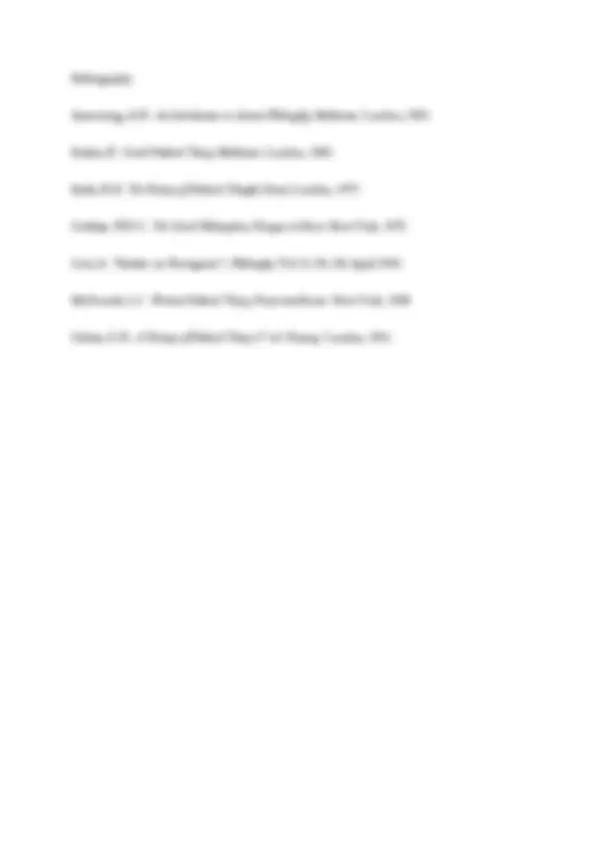




Study with the several resources on Docsity

Earn points by helping other students or get them with a premium plan


Prepare for your exams
Study with the several resources on Docsity

Earn points to download
Earn points by helping other students or get them with a premium plan
Community
Ask the community for help and clear up your study doubts
Discover the best universities in your country according to Docsity users
Free resources
Download our free guides on studying techniques, anxiety management strategies, and thesis advice from Docsity tutors
Man is the measure of all things, of the reality of things that are, and the unreality of things that are not.1. If this quotation was made by anyone but a ...
Typology: Exams
1 / 4

This page cannot be seen from the preview
Don't miss anything!



Man is the measure of all things, of the reality of things that are, and the unreality of things that are not.^1
If this quotation was made by anyone but a professional teacher, it would be reasonable to allow an interpretation “that the way things appear to one man is the truth for him, and the way they appear to another is the truth for him”.^2 Protagorus however, was a Sophist, and while these teachers are noted for being sceptical, taking this interpretation to any extreme would make his profession of no practical use.^3 As Sabine has noted “this would be, indeed a suicidal doctrine for a professional teacher”.^4 The meaning of Protagorus’s famous quotation depends on his own role as a teacher, and also upon the implicit alternative to his statement.
If man is not the measure of all things, then presumably the gods are, so rather than a statement of extreme individualism, Protagorus is refuting a position from which he would have to accept received truth from outside human experience. His other famous aphorism, “as to the gods, I cannot know whether they exist or not, too many obstacles are in the way, the obscurity of the subject and the shortness of life”^5 tends to confirm this view. For a pragmatic man teaching young men how to succeed in the world of politics, these humanistic and agnostic statements provide the basis for and set the limits of what he feels he can teach. The knowledge that he intends to pass on is a “strictly human enterprise”.^6 That by removing divine sanctions from the rule of morality Protagorus opened the way for the loss of these morals by the later Sophists, does not lessen his own attempt to continue an ethical position without resort to unchanging standards based on religion which cannot be certainly known.
(^12) Protagorus, quoted in Armstrong, A.H. An Introduction to Ancient Philosophy , Metheun: London,1965, p.23. 3 Guthrie, W.K.C.Ibid.^ The Greek Philosophers , Harper and Row: New York, 1975, p.68. (^45) Sabine, G.M. A History of Political Theory 3 rd (^) ed. Harrap: London, 1951, p.37. 6 Protagorus, quoted in Armstrong, op. cit.Sabine, op. cit.
In a cultural milieu in which some Greeks had little to do apart from their duties to their city- state as a citizen, which was after all politics and law, Protagorus’s Man-Measure principle justifies and necessitates the task of the Sophists. Allowing that Man determines what is true gives a dangerous freedom which is a threat to the rule of law and morality if not directed by careful teaching. That Protagorus was no revolutionary is exemplified by the words Plato gives him, stating that “the individual educator – father or mother, teacher or Sophist is only the agent of the community and the organ of the common will”.^7 This is essentially a conservative view with the Sophist playing a role perpetuating common sense views generally held in the community, allowing Protagorus to be seen as “an empiricist who believed in the normal common sense of man”. 8 The role of the teacher is to reconcile the possibility of people holding different views with accepted common sense. Using an analogy in which the sick man and the well can have differing and equally true views of how food tastes, Plato has Protagorus liken the teacher’s role to that of a doctor as, “in education it is necessary to remove [men] from a disposition to a better one; but the physician brings about the changes with medicine, and the Sophist with speeches”.^9 Individualistic interpretations of the Man-Measure principle notwithstanding, there are still better truths to be had by one whose soul’s disposition has been improved by the education received from the Sophist.
If Protagorus really meant that the way things appear to each man is the truth for him, then all the shades of different meaning taken from his statement must be valid for the scholar who takes that view. Like every other field of learning, the study of political science and even Protagorus himself is made to look redundant if an extreme individualistic interpretation of the Man-Measure principle is followed to its logical conclusion. What is more likely is that for Protagorus and the people he taught, as for us, there is a body of common sense empirical views which men have “measured” independent of anything but human experience, upon which (^78) Plato, quoted in Barker, E. Greek Political Theory , Methuen: London, 1969, p.72. 9 Ibid. p.70.Plato, quoted in Levi, A. “Studies on Protagorus” Philosophy , Vol 15, No. 58, April 1940, p.163.
Bibliography
Armstrong, A.H. An Introduction to Ancient Philosophy , Metheun: London, 1965.
Barker, E. Greek Political Theory , Methuen: London, 1960.
Berki, R.N. The History of Political Thought , Dent: London, 1977.
Guthrie, W.K.C. The Greek Philosophers , Harper & Row: New York, 1975.
Levi, A. “Studies on Protagorus”, Philosophy , Vol 15, No 58, April 1940.
McDonald, L.C. Western Political Theory , Harcourt-Brace: New York, 1968.
Sabine, G.H. A History of Political Theory 3 rd^ ed. Harrap: London, 1951.